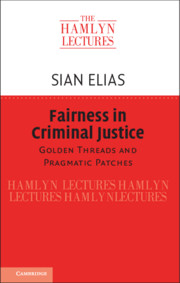
-
Select format
-
- Publisher:
- Cambridge University Press
- Publication date:
- August 2018
- August 2018
- ISBN:
- 9781108625777
- 9781108474351
- 9781108463157
- Dimensions:
- (216 x 138 mm)
- Weight & Pages:
- 0.34kg, 184 Pages
- Dimensions:
- (216 x 138 mm)
- Weight & Pages:
- 0.24kg, 184 Pages
- Subjects:
- Law: General Interest, Politics: General Interest, Criminology, Law, Criminal Law, Sociology
- Series:
- The Hamlyn Lectures
You may already have access via personal or institutional login- Subjects:
- Law: General Interest, Politics: General Interest, Criminology, Law, Criminal Law, Sociology
- Series:
- The Hamlyn Lectures
Book description
British criminal justice is a principal legacy of Empire in the common law world. It attempts fairness between prosecutors and accused in an accusatory system for establishing criminal responsibility supervised by a judge who is conspicuously detached from the fray. Fundamental features, today recognised as human rights, include the presumption of innocence and onus of proof, the privilege against self-incrimination, and the right to legal advice and representation. In these lectures, Dame Sian Elias examines modern challenges to this conception of criminal justice prompted by anxiety about crime and the costs and delays in proof of guilt. They include enlarged prosecutorial discretion in charging, incentivisation of early guilty pleas, adoption of reverse onuses of proof, application to criminal proceedings of principles of modern civil case management, and measures to bring the victim into the criminal justice system. The lectures question whether this repositioning risks the integrity of the system.
Contents
Metrics
Altmetric attention score
Full text views
Full text views help Loading metrics...
Loading metrics...
* Views captured on Cambridge Core between #date#. This data will be updated every 24 hours.
Usage data cannot currently be displayed.
Accessibility standard: Unknown
Why this information is here
This section outlines the accessibility features of this content - including support for screen readers, full keyboard navigation and high-contrast display options. This may not be relevant for you.
Accessibility Information
Accessibility compliance for the PDF of this book is currently unknown and may be updated in the future.


